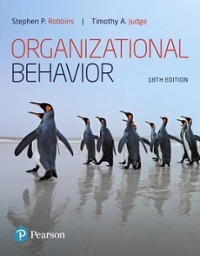We talked about sexual harassment and how uneven power dynamics can contribute to sexual harassment. Sexual harassment
Question:
We talked about sexual harassment and how uneven power dynamics can contribute to sexual harassment. Sexual harassment often occurs because one employee, such as a supervisor, can use his or her control of resources to reward or coerce another employee into sexual behaviors. For example, when a manager asks a female subordinate to go on a date with him, the female subordinate is more likely to say yes because he has control over resources in the organization. If she declines his request, he could retaliate and withhold privileges from her
Many companies try to prevent sexual harassment by forbidding coworkers from dating. Some have slightly softer rules. They forbid employees from dating their direct supervisors or coworkers in the same department, presumably so that employees cannot use their power to perpetrate sexual harassment. These less stringent policies do not account for informal power that may exist in organizations. An employee can be in a junior position and still be able withhold access to resources, or this employee can have enough political skill to harm another employee’s career.
On the other hand, it may be impractical to try to enforce a policy against office romances. Modern Americans spend one-third of their lives working, so it’s likely that an employee will meet a mate at the office. According to a 2015 survey by Careerbuilder.com, over one third of employees have dated a coworker. Many of these romances involved a power difference as well: 15 percent admitted that they’d dated a supervisor. Is it worth discouraging office romances? The same survey revealed that almost one-third of office relationships resulted in marriage. And what should you do if Cupid’s arrow strikes you in the breakroom? National workplace expert Lynn Taylor has this advice, “Policy or no policy, love happens. So in the absence of written rules...there’s one common barometer: your common sense.”
Questions
1. Do you think offices should include rules about office romances in their sexual harassment policies? Why or why not?
2. Is it ever okay for a supervisor to date a subordinate? What if someone becomes their romantic partner’s supervisor after the relationship was already initiated?
3. Why might 36 percent of the survey respondents say that they hid their romantic relationships from coworkers? How does this relate to what we learned about office gossip in Chapter 9?
Step by Step Answer:

Organizational Behavior
ISBN: 9780134729329
18th Edition
Authors: Stephen RobbinsTimothy JudgeTimothy Judge, Timothy Judge





